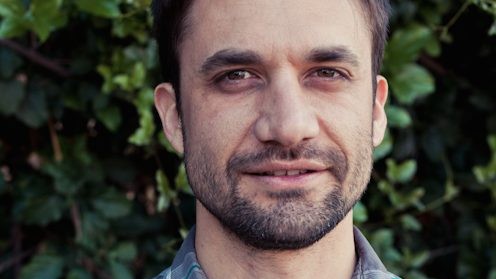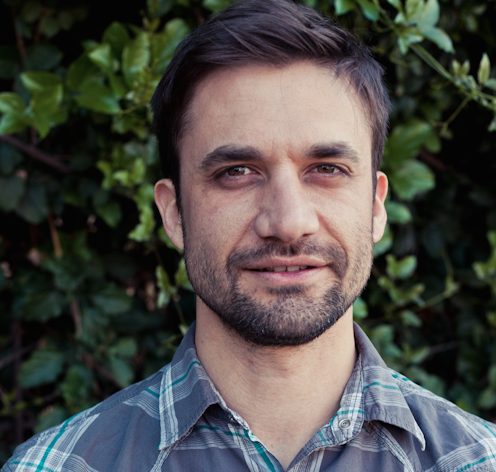Composer Nathan Whitehead has always been fascinated with music. From composing for video games, to television, and feature films, his range of work is expanding vastly. This time around, Nathan talks exclusively to CINEMACY about his experience working on the just-released thriller The Purge: Anarchy. We begin:
HAS MUSIC ALWAYS BEEN A FASCINATION TO YOU?
Yeah, it has always been a fascination. Fascination really feels like the right word too. I remember listening to my parents’ records and poking around on our piano and thinking about how exciting and mysterious the idea of creating music was. I didn’t always know I wanted to be a film composer but I was fascinated by music as far back as I can remember and I think the fascination and curiosity is as strong as ever today. It still feels mysterious.
HOW IMPORTANT IS A COMPOSER’S JOB IN RELATION TO THE FILM AS A WHOLE?
I think the composer’s job is somewhat unique in that we are providing this element to the film that is usually outside of the literal narrative. When we’re watching a movie we don’t say “hey, where’s that orchestra that’s playing?” We just usually accept the score as part of the film, in many cases we might not even notice it but we feel it. I think the composer has the unique opportunity to have this direct emotional input into a film and I think that’s very important. At the same time, I love the collaborative nature of filmmaking and the score is just one element. I think the composer’s job is critical but so is the writing and acting and directing and all the other departments. The amazing part is seeing it all come together.
WHAT WAS YOUR INSPIRATION GOING INTO THE COMPOSITION FOR THE PURGE 2?
We talked a lot about the madness of the night. That was something I kept in mind a lot, how could this music speak to all the madness that erupts on Purge night. Also, I think the city of Los Angeles and all it’s grit and beauty and sprawl provided inspiration. This film expands and takes place all over the city. There are these beautiful aerial shots of L.A. with the skyline and this sea of lights and it feels big and expansive. Then there are sequences where we are in the bowels of the city and it’s dark and we have all these urban sounds and textures closing in on us. This was all really cool inspiration. It provided a great canvas to create a score that felt larger in scope and then we dive into these intense, violent situations that are unfolding all over the city. It called for much more range in the score I think.
This film is really a sort of hybrid action-dystopian-thriller movie. It feels like it exists in between some of these genres rather than being a straight horror movie or action movie. Because of this we were always steering away from music that felt too traditionally action or too traditionally horror. We focused a lot on sounds and textures and paid a lot of attention to the emotional content of sounds. There are melodic motifs but finding sounds or textures that contained something intangible that felt like the world of The Purge was a big part of writing this score. So I tried to focus a lot on creating this unique vocabulary that would hopefully work between all these genres but still deliver the pacing and tension and emotion that we needed. It was really tricky at times because I couldn’t reach for some of my go-to tools or techniques but it was also a lot of fun creating all these textural and electronic elements.
LIKE GOOD EDITING, THE BEST JOBS OFTEN GO UNNOTICED. IT’S SUBTLE, YET MAKES A HUGE IMPACT ON A FILM’S OVERALL RECEPTION. IS THIS SOMETHING YOU ACKNOWLEDGE IN YOUR WORK?
Absolutely, and I think it’s fine to go unnoticed. My goal is to help make the best film that we can and do my part to help tell the story. If someone watches a film I scored and it makes a connection with them one way or another, that is awesome and I think it’s successful whether they specifically noticed the music or not.
YOU’VE WORKED ON A VARIETY OF PROJECTS, LIKE TRANSFORMERS: DARK SIDE OF THE MOON TO DESPERATE HOUSEWIVES; WHAT WAS THE MOST FUN YOU HAD WORKING ON A FILM?
Both the Purge films are at the top of the list in terms of having the most fun. The schedules were short (especially the first one) but it was a great experience working with James DeMonaco and the rest of the team. It felt very collaborative and I had a lot of freedom to explore ideas. I think James is a great director in that regard, he manages to create space for you to cultivate ideas and experiment, even on a crazy deadline, and he’s genuinely interested in what everyone is bringing to a project. Another really fun project was working with Sarah Smick and Ian Michaels on Friended to Death. The reasons are pretty much the same, we were able to have a great dialog and an openness to exploring ideas. To me, that collaboration is really fun and I think it usually results in better work from everyone.
WHO ARE A COUPLE OF YOUR FAVORITE ARTISTS, PAST AND PRESENT?
Wow, there are so many inspiring artists but to pick a couple I would say Jon Brion and Arvo Part. I think Jon Brion is incredibly diverse. I love his score for Magnolia andStep Brothers. He is also a fantastic song writer and has great production chops. It seems to me that he pays a lot of attention to both the sounds and the notes and combining composition and production, treating them almost as the same process, is an approach that makes a lot of sense to me and I’m impressed how well he does all these things. I think Arvo Part’s music is uniquely amazing in the way he can create sparse, minimal compositions with incredible depth and subtlety. Simple ideas are always so hard to pull off and I think are usually the most effective. I love how evocative and emotional Für Alina is for example. It’s this sparse piano piece but it’s so powerful.
I think I do my best work in my studio. It’s my laboratory. I try to make my studio an inspiring environment, sort of protect that space and try to use it only for writing. I think it’s really valuable to be able to have this dedicated space where I can lock myself away from distractions and just experiment freely. To me it’s a combination of this space to work in and also allowing the time to focus and not be interrupted. Time to just get lost in the process. That’s the ideal situation anyway, I don’t always have a nice big chunk of time but I do my best to build that in to my routine.
AS WELL AS SUCCESSFULLY WORKING AS A HOLLYWOOD COMPOSER, I HEAR YOU ALSO MAKE AWARD-WINNING CORNBREAD. WHAT’S NEXT ON YOUR LIST OF THINGS TO EXCEL AT?
Ha! Well, overall I think I just want to keep learning new things. I recently went fishing with my brother-in-law in Montana and I think I would like to learn to fly fish. I would also love to learn to play the cello.
Morgan Rojas
Certified fresh. For disclosure purposes, Morgan currently runs PR at PRETTYBIRD and Ventureland.



